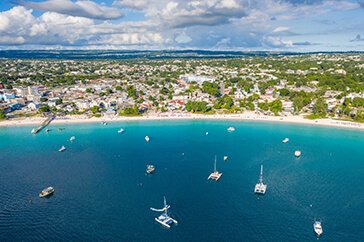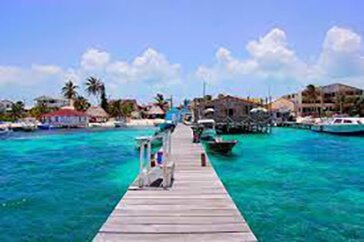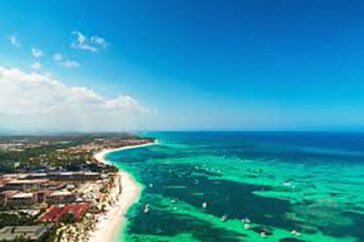Countries
We Provide List of Countries for Immigration

Bahamas
The Bahamas, located in the Atlantic Ocean off the coast of Florida, is an archipelago known for its stunning beaches, crystal-clear waters, and vibrant marine life. With a population of around 400,000 people, it is a popular tourist destination and a haven for outdoor enthusiasts. The capital city of the Bahamas is Nassau, situated on the island of New Providence, known for its colorful colonial architecture, bustling markets, and lively nightlife. The country's economy is driven primarily by tourism, as well as financial services, shipping, and agriculture. The Bahamas is known for its luxury resorts, water-based activities such as snorkeling and diving, and duty-free shopping. The Bahamas has a rich cultural heritage shaped by its history of British colonization, African slavery, and indigenous Lucayan people. The country is known for its Junkanoo festivals, traditional music, dance, and cuisine, which blend African, Caribbean, and European influences. Despite its natural beauty and economic prosperity, the Bahamas faces challenges such as environmental degradation, vulnerability to hurricanes, and economic inequality. Efforts to address these challenges and promote sustainable development, conservation, and social welfare are ongoing. Overall, the Bahamas is a paradise destination offering visitors a blend of relaxation, adventure, and cultural immersion amidst its pristine natural surroundings and warm hospitality.


Barbados
Barbados, located in the eastern Caribbean, is an island nation known for its stunning beaches, vibrant culture, and friendly locals. With a population of around 287,000 people, it is one of the most populous countries in the Caribbean. The capital city of Barbados is Bridgetown, a historic port city known for its colonial architecture, bustling markets, and UNESCO World Heritage-listed sites such as the Garrison Historic Area. The country's economy is primarily based on tourism, as well as financial services, agriculture, and manufacturing. Barbados is known for its luxury resorts, water sports, and vibrant nightlife. Barbados has a rich cultural heritage shaped by its history of British colonization, African slavery, and indigenous Carib and Arawak peoples. The country is known for its festivals, such as Crop Over, which celebrates the end of the sugar cane harvest with music, dance, and colorful costumes. Barbadian music genres such as calypso and soca are also popular worldwide. Despite its natural beauty and economic prosperity, Barbados faces challenges such as vulnerability to hurricanes, economic inequality, and environmental degradation. Efforts to address these challenges and promote sustainable development, conservation, and social welfare are ongoing. Overall, Barbados is a paradise destination offering visitors a blend of relaxation, adventure, and cultural immersion amidst its pristine beaches, lush landscapes, and warm hospitality.


Belize
Belize, located on the eastern coast of Central America, is a small yet culturally diverse country known for its lush rainforests, vibrant coral reefs, and ancient Mayan ruins. With a population of around 400,000 people, it is one of the least densely populated countries in the region. The capital city of Belize is Belmopan, a modern city known for its government buildings and administrative functions. However, the largest city and economic hub is Belize City, located on the Caribbean coast. Belize's economy is primarily based on agriculture, tourism, and services. The country is known for its production of sugar cane, citrus fruits, and marine products, as well as its growing tourism industry, which attracts visitors with its natural beauty, water-based activities, and cultural heritage. Belize has a rich cultural heritage shaped by its history of Mayan civilization, British colonization, and African, European, and indigenous influences. The country is known for its diverse ethnic communities, languages, and traditions, reflected in its music, dance, cuisine, and festivals such as the Garifuna Settlement Day and Carnival. Despite its natural beauty and cultural richness, Belize faces challenges such as environmental degradation, and vulnerability to natural disasters. Efforts to address these challenges and promote sustainable development, conservation, and social welfare are ongoing. Overall, Belize is a country of natural wonders, cultural diversity, and warm hospitality, offering visitors a blend of adventure, relaxation, and cultural immersion in the heart of the Caribbean.


Canada
Canada, located in North America, is the second-largest country in the world by land area, renowned for its stunning natural landscapes, diverse culture, and high quality of life. With a population of over 37 million people, it is one of the most sparsely populated countries globally. The capital city of Canada is Ottawa, known for its historic architecture, government buildings, and cultural institutions such as the National Gallery of Canada. However, the most populous city and economic hub is Toronto, followed by Montreal, Vancouver, and Calgary. Canada's economy is diverse, with key sectors including natural resources (such as oil, gas, minerals, and timber), manufacturing, services, technology, and tourism. The country is known for its abundance of natural resources, including oil sands in Alberta, hydroelectric power in Quebec, and vast forests and freshwater reserves. Canada has a rich cultural heritage shaped by its history of indigenous peoples, European colonization, and multicultural immigration. The country is known for its inclusivity, tolerance, and respect for diversity, reflected in its multiculturalism policies and celebrations of cultural festivals and events. Despite its strengths, Canada faces challenges such as climate change, indigenous rights, social inequality, and reconciliation with indigenous peoples. Efforts to address these challenges and promote sustainable development, social justice, and reconciliation are ongoing. Overall, Canada is a country of natural beauty, cultural richness, and opportunity, offering visitors a wide range of experiences from its bustling cities to its pristine wilderness, including iconic landmarks such as the Rocky Mountains, Niagara Falls, and the Northern Lights.


Costa rica
Costa Rica, located in Central America, is a small yet biodiverse country known for its stunning natural landscapes, commitment to environmental conservation, and laid-back lifestyle. With a population of around 5 million people, it is one of the most stable and prosperous nations in Latin America. The capital city of Costa Rica is San José, a vibrant cultural hub known for its colonial architecture, museums, and lively markets. Other major cities include Heredia, Alajuela, and Cartago. Costa Rica's economy is diversified, with key sectors including tourism, agriculture, technology, and eco-friendly industries. The country is known for its sustainable tourism practices, which attract visitors with its pristine beaches, lush rainforests, and abundant wildlife. Costa Rica has a rich cultural heritage shaped by its history of indigenous peoples, Spanish colonization, and immigrant influences. The country is known for its pura vida (pure life) philosophy, which emphasizes a relaxed and simple way of living, as well as its music, dance, and festivals such as Día de los Diablitos and Día de la Independencia. Despite its natural beauty and stability, Costa Rica faces challenges such as income inequality, urbanization, and environmental degradation. Efforts to address these challenges and promote sustainable development, social welfare, and environmental conservation are ongoing. Overall, Costa Rica is a country of natural wonders, cultural richness, and warm hospitality, offering visitors a blend of adventure, relaxation, and eco-friendly experiences in the heart of Central America.


Dominican republic
The Dominican Republic, located on the island of Hispaniola in the Caribbean, is a country known for its beautiful beaches, diverse ecosystems, and vibrant culture. With a population of over 10 million people, it is the second-largest nation in the Caribbean. The capital city of the Dominican Republic is Santo Domingo, the oldest continuously inhabited European settlement in the Americas and home to UNESCO World Heritage Sites such as the Colonial Zone. The country's economy is diverse, with key sectors including tourism, agriculture, manufacturing, services, and remittances from Dominicans living abroad. The Dominican Republic is known for its production of sugar, coffee, tobacco, cocoa, and tourism-related services. The Dominican Republic has a rich cultural heritage shaped by its history of indigenous Taino people, Spanish colonization, African slavery, and cultural fusion. The country is home to numerous cultural landmarks, including colonial-era architecture, colorful merengue and bachata music, lively festivals such as Carnival, and traditional dishes such as mangu and sancocho. Despite its natural beauty and cultural richness, the Dominican Republic faces challenges such as poverty, inequality, environmental degradation, and political corruption. Efforts to address these challenges and promote sustainable development are ongoing, with a focus on economic growth, social welfare, and environmental conservation. Overall, the Dominican Republic is a country of warm hospitality, cultural diversity, and natural beauty, offering visitors a unique and unforgettable experience in the heart of the Caribbean.


Jamaica
Jamaica, located in the Caribbean Sea, is an island nation known for its vibrant culture, stunning beaches, and reggae music. With a population of around 2.9 million people, it is the third-largest island country in the Caribbean. The capital city of Jamaica is Kingston, a bustling urban center known for its lively music scene, historic landmarks, and vibrant street life. Jamaica's economy is diverse, with key sectors including tourism, agriculture, mining, manufacturing, and services. The country is known for its production of sugar, bananas, coffee, bauxite, and rum. Jamaica has a rich cultural heritage shaped by its history of indigenous peoples, European colonization, African slavery, and East Indian indentured labor. The country is home to numerous cultural landmarks, including colonial-era plantations, heritage sites, and music venues, reflecting its diverse ethnic and cultural influences. Jamaican culture is celebrated for its music, dance, cuisine, and vibrant festivals such as Carnival and Reggae Sumfest. Despite its natural beauty and cultural richness, Jamaica faces challenges such as poverty, crime, environmental degradation, and economic inequality. Efforts to address these challenges and promote sustainable development are ongoing, with a focus on economic diversification, social welfare, and environmental conservation. Overall, Jamaica is a country of warm hospitality, cultural vibrancy, and natural beauty, offering visitors a unique and unforgettable experience in the heart of the Caribbean.


Mexico
Mexico, located in North America, is a country known for its rich history, diverse culture, and stunning natural beauty. With a population of over 126 million people, it is the most populous Spanish-speaking country in the world. The capital city of Mexico is Mexico City, one of the largest cities in the world, known for its historic center, colonial architecture, and vibrant street life. Mexico's economy is diverse, with key sectors including manufacturing, agriculture, services, and tourism. The country is known for its production of automobiles, electronics, textiles, and agricultural products such as avocados, tomatoes, and tequila. Mexico has a rich cultural heritage shaped by its history of indigenous civilizations, Spanish colonization, and diverse ethnic influences. The country is home to numerous UNESCO World Heritage Sites, including ancient ruins such as Teotihuacan and Chichen Itza, as well as vibrant cultural traditions such as Day of the Dead celebrations. Mexican cuisine is celebrated for its bold flavors, fresh ingredients, and diverse regional dishes such as tacos, tamales, and mole. Mexican music, dance, and art are also integral parts of the country's cultural identity, with genres such as mariachi, banda, and folklorico showcasing its rich artistic heritage. Despite its cultural richness and natural beauty, Mexico faces challenges such as poverty, crime, corruption, and environmental degradation. The government has implemented various initiatives to address these challenges and promote economic development, social welfare, and environmental sustainability. Overall, Mexico is a country of contrasts, blending ancient traditions with modernity, urban development with natural beauty, and cultural diversity with warm hospitality, making it a fascinating and dynamic destination for travelers and investors alike.


Nicaragua
Nicaragua, located in Central America, is a country known for its diverse landscapes, vibrant culture, and turbulent history. With a population of over 6.7 million people, it is the largest country in Central America by area. The capital and largest city of Nicaragua is Managua, situated on the southwestern shore of Lake Managua. Nicaragua's economy is primarily based on agriculture, with key crops including coffee, bananas, sugar cane, and tobacco. The country also has potential in tourism, given its rich biodiversity, stunning beaches, and cultural attractions. Nicaragua has a complex history marked by colonialism, revolution, and civil conflict. The country gained independence from Spain in the 19th century but has faced periods of political instability and authoritarian rule. The Sandinista Revolution in the late 1970s led to the establishment of a socialist government, followed by a protracted civil war. Nicaragua has since transitioned to a democratic republic, but political tensions persist. Nicaraguan culture is a blend of indigenous, European, and African influences, reflected in its music, dance, cuisine, and festivals. Traditional Nicaraguan dishes such as gallo pinto (rice and beans), nacatamales (cornmeal tamales), and vigorón (pork and yuca salad) are popular staples. Despite its natural beauty and cultural richness, Nicaragua faces challenges such as poverty, inequality, corruption, and environmental degradation. Efforts to address these challenges and promote sustainable development are ongoing, with a focus on economic diversification, infrastructure development, and social welfare programs. Overall, Nicaragua is a country of contrasts, offering visitors a unique blend of natural wonders, cultural heritage, and historical significance.


United States
The United States of America (USA), often referred to as the U.S. or simply America, is a vast and diverse country located in North America, bordered by Canada to the north and Mexico to the south. It is comprised of 50 states, a federal district (Washington, D.C.), and several territories. The capital city of the United States is Washington, D.C., known for its iconic landmarks such as the White House, Capitol Building, and Smithsonian museums. However, the most populous city and economic hub is New York City, followed by Los Angeles and Chicago. The United States has the world's largest economy, characterized by its diverse sectors including finance, technology, manufacturing, healthcare, and agriculture. It is a global leader in innovation, science, and technology, with Silicon Valley serving as a major hub for technology companies. The U.S. has a rich cultural heritage shaped by its history of immigration, indigenous peoples, European colonization, African slavery, and various waves of migration from around the world. The country is known for its cultural diversity, reflected in its cuisine, music, literature, art, and festivals. Despite its strengths, the United States faces challenges such as political polarization, social inequality, racial tensions, healthcare disparities, and environmental concerns. Efforts to address these challenges and promote economic growth, social justice, and environmental sustainability are ongoing. Overall, the United States is a country of opportunity, diversity, and innovation, offering visitors a wide range of experiences from its bustling cities to its stunning natural landscapes and cultural landmarks.
